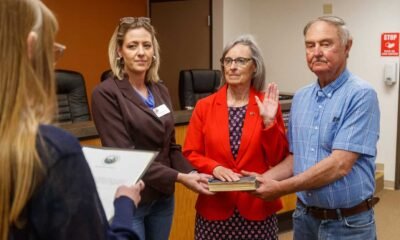attorney general
Farmers and Cities Unite to Challenge Mayes’ Groundwater Lawsuit

A significant legal battle is underway as a coalition of farmers, ranchers, and municipalities challenges Arizona Attorney General Kris Mayes in her lawsuit against Fondomonte, a Saudi-owned alfalfa farm using local groundwater.
Attorney David Brown argues that Mayes’ claims lack legal grounding, stating the farm does not violate state water laws. He contends that Mayes is attempting to label the farm’s operations as a “public nuisance” due to concerns over groundwater depletion in Maricopa County.
Brown warns that a favorable ruling for Mayes could set a dangerous precedent, potentially threatening the water usage rights of other Arizona groundwater users. His clients, organized under the Arizona Farm and Ranch Group Coalition, include farmers and cities reliant on groundwater.
The outcome of this case could reshape the legal landscape for water rights in Arizona, affecting how groundwater is accessed statewide. Brown insists that Mayes’ lawsuit lacks merit and should be dismissed.
Mayes remains firm in her position, opposing the coalition’s motion to intervene in the case but has not provided additional comments. The heart of the matter lies in Arizona’s groundwater laws, which permit extensive water use outside designated “active management areas.”
Fondomonte grows alfalfa, primarily for dairy cattle in Saudi Arabia, where such agriculture is restricted. Meanwhile, legislative efforts to impose further controls on groundwater usage in rural areas have stalled, prompting Mayes to pursue a novel legal argument framing the situation as a public nuisance.
Mayes has asserted that Fondomonte’s extensive pumping is detrimental to local water supplies. However, Brown asserts that under Arizona law, landowners have rights to use groundwater for beneficial purposes, thereby questioning the attorney general’s approach.
The lawsuit raises serious implications for all groundwater users in Arizona. Brown believes that a ruling against Fondomonte could impede the future rights of farmers and municipalities reliant on water resources.
Whether Mayes can successfully apply nuisance law in this context remains uncertain. Existing statutes suggest that agricultural operations are generally exempt unless proven to significantly impact public health and safety, a claim Mayes is now making.
Historical context adds complexity, as Mayes previously attempted a similar nuisance claim successfully, though that case did not culminate in a judicial precedent.
The ruling by Judge Scott Minder will be critical. Should Mayes’ claims be upheld, it could usher in a new era of regulatory approaches to groundwater use in Arizona.


















